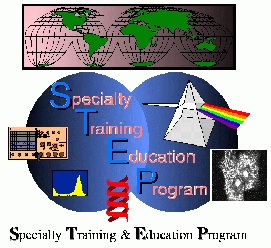![]()
Specialty Training & Education Program

[Introduction to STEP] [Specialty Areas] [STEP Committee Members] [Search for Keyword]
Multiparameter Immunophenotyping
Laboratory of Flow Cytometry Roswell Park Cancer Institute Buffalo, NY 14263
Laboratory Profile
Carleton C. Stewart, Ph.D.1. Facilities:
4500 square feet consisting of a complete molecular biology laboratory, tissue culture laboratory, optics and electronics laboratory, fabrication shop, general biology laboratory, and computer laboratory. Animal facilities are also available for both rodents and larger mammals.2. Instrumentation:
A FACSVantage SE is available capable of 9 parameter real-time data acquisition, 8 colors of fluorescence detection using separate excitation wavelengths from 3 lasers (Innova 90, ILT air-cooled argon lasers, and Innova 70 to pumped dye laser) with third time delay windowing, complete cross beam compensation, electronic autofluorescence reduction, and high speed cell sorting (at threshold rate of 20k/sec). A second FACStar is also available capable of 5-parameter real-time data acquisition using a single laser excitation source. A modified FACScan is available capable of 6-parameter data acquisition including 4 colors of fluorescence and electronic autofluorescence reduction using a single laser. A FACSCalibur also provides 6 parameter, 4 color data acquisition using two lasers. Data analysis programs: BDIS: Mac Cell Quest, HP Lysys I & II, Attractors. Verity: Winlist, Modfit, HP Reader, WHPPC. Phoenix: List view, Multicycle. MSA’s MACLas and WINLas.3. Specialization Areas:
The major area of emphasis of this laboratory is multiparameter flow cytometry. Virtually any combination of fluorochromes can be combined together for simultaneous measurements of cellular identification and function. Procedures have been developed for analysis of as few as 10,000 cells per sample. Both cellular and molecular biology procedures are available for direct immunophenotyping and molecular phenotyping using in situ hybridization or in situ PCR. Cells may be sorted for viable cell function studies or molecular interrogation. For the latter, using PCR, either gene copy number or mRNA transcripts can be quantitatively evaluated on as few as 100 cells.4. Special Opportunities:
Flow cytometry training: Instrumentation setup for multiparameter data acquisition will be taught. Special instruction in the use of three laser excitation in three distinct timing windows, rare event analysis, and sorting at interrogation rates up to 20k/sec will be taught and are available for practical applications and experience. The use of conventional and sophisticated data analysis software for analysis of multiparameter data will be
taught and practical experience gained through its use.5. Special Courses Offered:
A course in the detection methods for minimum residual disease is now offered. This will include detection of all hematopoietic malignancies and for breast cancer metastasis in blood and bone marrow products. The important principles for developing such tests for other solid tumors are described and discussed.6. Graduate Program:
A Masters or Ph.D. program in Experimental Pathology or Immunology is available through the Roswell Park Graduate Division of the State University of New York at Buffalo (SUNYAB). Individuals seeking either program may apply directly to the graduate division and mention flow cytometry as the preferred specialty. Tuition for the Ph.D. program can be waived for qualifying candidates and a stipend ($10,700) is available for qualifying Ph.D. candidates. A work study program is available for Masters candidates that will provide modest living expenses ($7,220/year).7. Local Accommodations:
The Holiday Inn ($59 per night) has free shuttle service to both the Buffalo Airport and RPCI. Local restaurants abound within walking distance of either RPCI or the Holiday Inn. The University Guest Quarters on the South Campus of SUNY at Buffalo ($35 per night). Other hotels and rental locations (for longer visits) are available.8. Transportation:
Transportation: Bus, Amtrak, and airline service to Buffalo is convenient and frequent. RPCI is 10 minutes by taxi or limo from the bus (Oak St.) or train stations (Exchange St.) or 15 minutes from the airport. All major rental car agencies are available at all three locations.9. Cost of Internships:
A basic rate of $100/day is charged for standard laboratory tests. These include standard reagents, antibodies, and flow cytometry time. Cost for non-standard materials or supplies, if any, will be determined after discussion of the particular project requirements. All times during the year are equally good except the Thanksgiving to Christmas period.Carleton C. Stewart, Ph.D.
Director, Laboratory of Flow Cytometry
Roswell Park Cancer Institute
Buffalo, NY 14263
Phone: (716) 845-8471
FAX: (716) 845-8806
email: stewart@sc3101.med.buffalo.edu
[Introduction to STEP] [Specialty Areas] [STEP Committee Members] [Search for Keyword]
If you have suggestions or comments related to the STEP Program in general, problems with this particular page, or you want to know how to be a STEP program lab, send me an email message now
jpr@flowcyt.cyto.purdue.edu or contact me at the address below.![]()